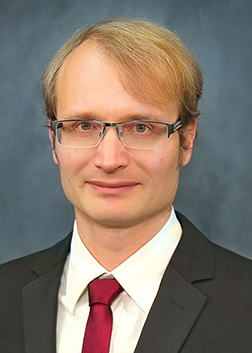Electrical and Computer Engineering's Marojevic among team awarded National Science Foundation grant to address 5G security

Vuk Marojevic
Vuk Marojevic was among the group of five NSF-funded teams awarded a total of $25 million to advance technologies and communications to operate securely through 5G networks.
Marojevic, a Department of Electrical and Computer Engineering associate professor and a co-pi for the project entitled Zero Trust X (ZTX), said the team’s project will address 5G security at different layers and components of the network, specifically at the 5G UE, 5G RAN, and 5G Core.
"This project is exciting yet very complex. Our team proposed to prototype and demonstrate about 10 different security solutions which, if successful, can have a huge value to society, military operations, and business,” he said. “What most people don't know is that NSF has a lot of non-research requirements, such as 2-semester curriculum development, for this program, and DoD already started proposing new development directions and testbed demonstrations for our team."
The project, led by the University of Kansas’ Taejoon Kim, who serves as the primary investigator, was awarded $5 million as part of NSF’s Phase 2 of NSF Convergence Accelerator Track G: Securely Operating Through 5G Infrastructure. The Convergence Accelerator Track G aims to enable enhancements to end devices -- such as smartphones and tablets -- and augment 5G wireless infrastructure, providing capabilities to military, government and critical infrastructure operators to operate through public 5G networks while meeting security and resilience requirements. The convergent track supports the development of technologies to secure 5G and permit the secure use of non-secure networks.
Marojevic explained that reliable and high-rate 5G wireless access has become a global necessity; however, the US must catch up in wireless leadership, lacking major radio access network (RAN) or cellular network manufacturers. The project aims to develop Zero Trust Chain software that enables military squads to securely share situational awareness in their operations using high-performance, yet often untrusted, 5G networks. The software solution leverages the flexibility of the 5G standard. It implements innovative security solutions at different network nodes and layers to empower DoD operators to detect malicious entities quickly and establish communication mechanisms to prevent access to or control DoD traffic.
The project will also train a diverse team of students in research and provide open-source software that facilitates portability, reproducibility and integration with other Track G solutions of this program.
Launched in 2019, the NSF Convergence Accelerator -- a TIP program -- builds upon NSF's investment in basic research and discovery to accelerate solutions toward societal and economic impact. The program's multidisciplinary teams use convergence research fundamentals and innovation processes to stimulate innovative idea-sharing and the development of sustainable solutions. For more information about the NSF Convergence Accelerator program, visit the Convergence Accelerator webpage.
TIP harnesses the nation's vast and diverse talent pool to accelerate critical and emerging technologies and address pressing societal and economic challenges. The directorate comprises three primary focus areas: fostering innovation and technology ecosystems, establishing translation pathways, and partnering across sectors to improve U.S. competitiveness, grow the U.S. economy and engage and train a diverse workforce for future, high-wage jobs. For more information about TIP, visit the TIP webpage.
The Department of Electrical and Computer Engineering is online at www.ece.msstate.edu and can be found onFacebook, YouTube, Instagram, Twitter and Linkedin.
The Bagley College of Engineering is online at www.bagley.msstate.edu and can be found on Facebook, Twitter, Instagram and YouTube at @msuengineering.
Mississippi State University is taking care of what matters. Learn more at www.msstate.edu.
Camille Carskadon | Bagley College of Engineering



